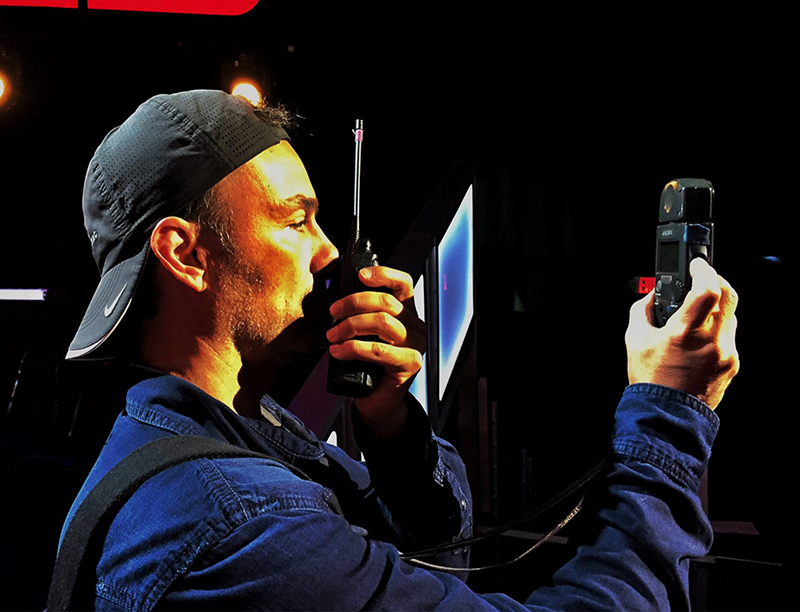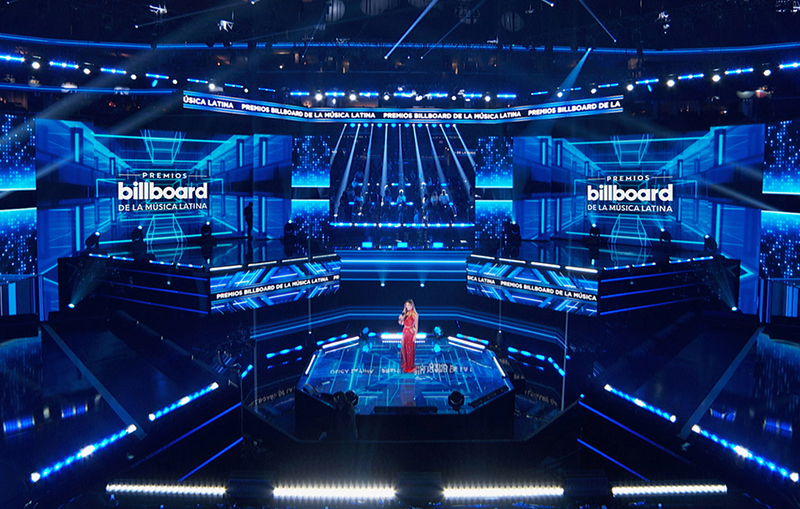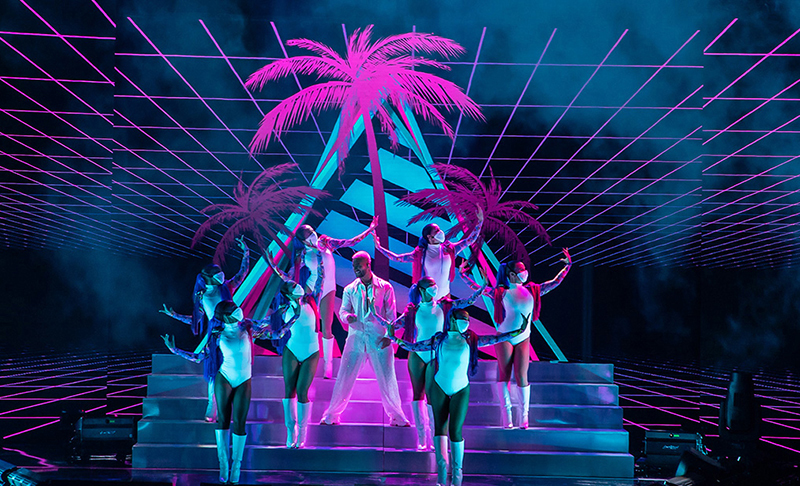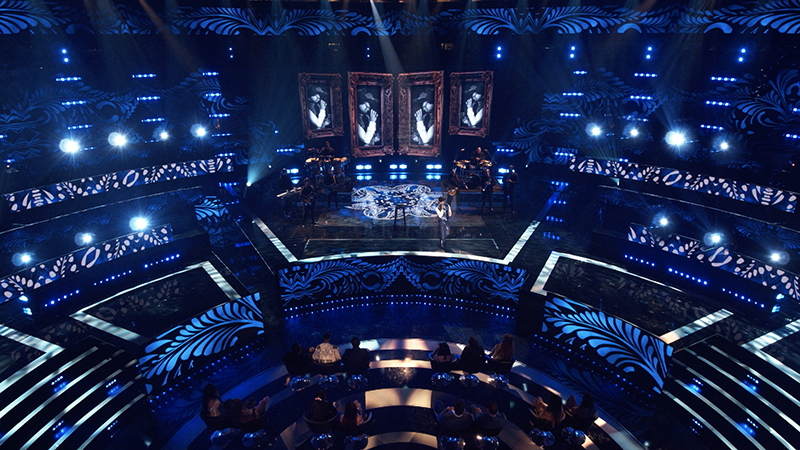
John “JD” Daniels is a lighting designer for television with numerous music special event credits including the Billboard Latin Music Awards and the Latin American Music Awards. Based in Miami, Daniels got his start at WPBT2, the PBS station in Miami, when they were looking for someone to hang lights. Having a degree in communications, he seized the opportunity at the station to learn all the aspects of television production including working behind the camera and experimenting with different lighting techniques, learning from the lighting director Tony Puente. Daniels recalls, “It was really a great learning environment and I got to learn the industry inside out.” After nearly a decade there, he moved to Univision as a lighting director working with Univision LDs Curt Contrata and Carlos Colina. There he lit a variety of shows and worked on more music performances and award shows. Today Daniels is a respected independent lighting designer and most recently lit the 2021 Latin AMAs, among the first events returning to an entirely live production with an audience at the BB&T Center in Sunrise, FL.
PLSN: Among your list of credits, were there particular jobs, that really set you on the course of your career?
JD: I don’t think I had like a seminal moment, or an epiphany where, ‘wow, this is it.’ I think it’s just been years and years of just grinding. It was a gradual thing; just continually questioning what I’m doing, and trying different things that let me keep growing in my work. That’s the thing about building a career — just that thirst for evolving and not just becoming complacent. For me, I say ‘that was a great show. Okay, so, what are we going to do next time?’ Because we can do the same show and it’ll still be a great show but that invariably gets boring; you get bored and producers get bored. They want something different and fresh. Myself and my team at the core — we are who we are, everyone has their own style but you also have to work to be breaking that mold, and getting outside of your comfort zone. You have to do that to keep yourself relevant and to keep it interesting. And to inevitably keep employed.

What’s an important skill or trait needed for your job?
You really have to stay focused. There’s a lot going on when working on a show, and you really have to cut through all the noise. There are all these extraneous distractions that come with our business, but at the end of the day, the light has to fade up and it has to be right. It has to be what the client wants. It’s as simple as that. It’s just figuring out how to focus on that and let all the other peripheral stuff go. I find keeping focus on the job at hand has been one of the attributes that I lean on the most. I think I developed that running camera, just tuning into what needs your attention, and not letting things distract you.
What do you enjoy most about your career?
I enjoy working as a team. That’s probably one of the most gratifying things; coming together with a bunch of people and succeeding in whatever endeavor it is. That’s more gratifying than doing something as an individual. After the show, everyone’s just jacked up, it’s like an adrenaline rush. I like that experience, that buzz that you get when the team succeeds. I would say that’s probably what I enjoy most.

Who have some of your mentors been?
I would start with Tony Puente, at PBS Channel 2 in Miami. He was my first mentor, a great lighting director with a real understanding of light. I learned a lot from Tony. Then, I would say Curt Contrata, who was the lighting designer at Univision. From Curt I learned organizational skills, learning how to be efficient, how to think of putting systems together quickly, and how to work long hours and handle the day-to-day of dealing with producers. He told me one time, ‘we’re just a service department. We’re the Sherman Williams of lighting.’ That still resonates years later. Obviously, there’s a glamorous side to our business, but at the end of the day, there is a service department aspect to what we do.
As I grew in my own career, I learned my own little tricks and my own philosophies but — for me — it really is about listening to your client. It’s not always about what you want or how you want to light it. The clients’ needs must be considered as well. Fighting that is futile. But when you’re young, you bang your head against that wall for a couple of years before you realize the path of least resistance is much easier and can be more creative. I listen to my clients and say, ‘no worries’ and get to the job of lighting it. I’m happy, they’re happy, and it’s less stressful for everyone at the end of the day. It also builds trust with your client and then you end up doing what you want.
Is there a piece of advice you got at the start of your career that you still find applicable today?
Whatever you’re doing, just work hard and do a good job. I tell my kids that. I’m like, ‘Hey, this may not be the job that you think of as a career, but this is where you are today. Work hard, give it a hundred percent, because if you do a hundred percent, good things are going to happen’. That’s been my mantra — just work hard, grind, and everything else will take care of itself. Money, rates, all the other things that come with our business have come from just grinding and working hard on each job.

What piece of advice would you give to people in the early stages of their careers?
There are a lot of talented people in this business. I’ve seen many of them, but just because they don’t have the skills to handle relationships — clients or colleagues — I’ve seen them crash and burn. Then, conversely, you see people that maybe aren’t so talented, but they get these awesome gigs, and it’s because they know how to schmooze. It’s really important to learn how to deal with people. I would say to someone starting out to work on building the skill to build relationships. That’s just as important as the art and the work. Learn how to handle that client relationship, and learn how to say what to who, and when. You have to focus on that skill as much as you do on the lighting part of your career.
What has surprised you most about your career path?
I never expected to get to design this level of productions. Looking back, I didn’t necessarily see myself as the lighting designer for the Latin Billboards or the Latin AMAs. I never envisioned that, but it goes back to my point that if you put your head down and work hard you’ll get there. When you quit looking up and patting yourself on the back, and just get the job done is when I believe good things will happen. That has been my experience. So yeah, I never envisioned that I would be working on the productions I get to light now, but I really love doing them.


